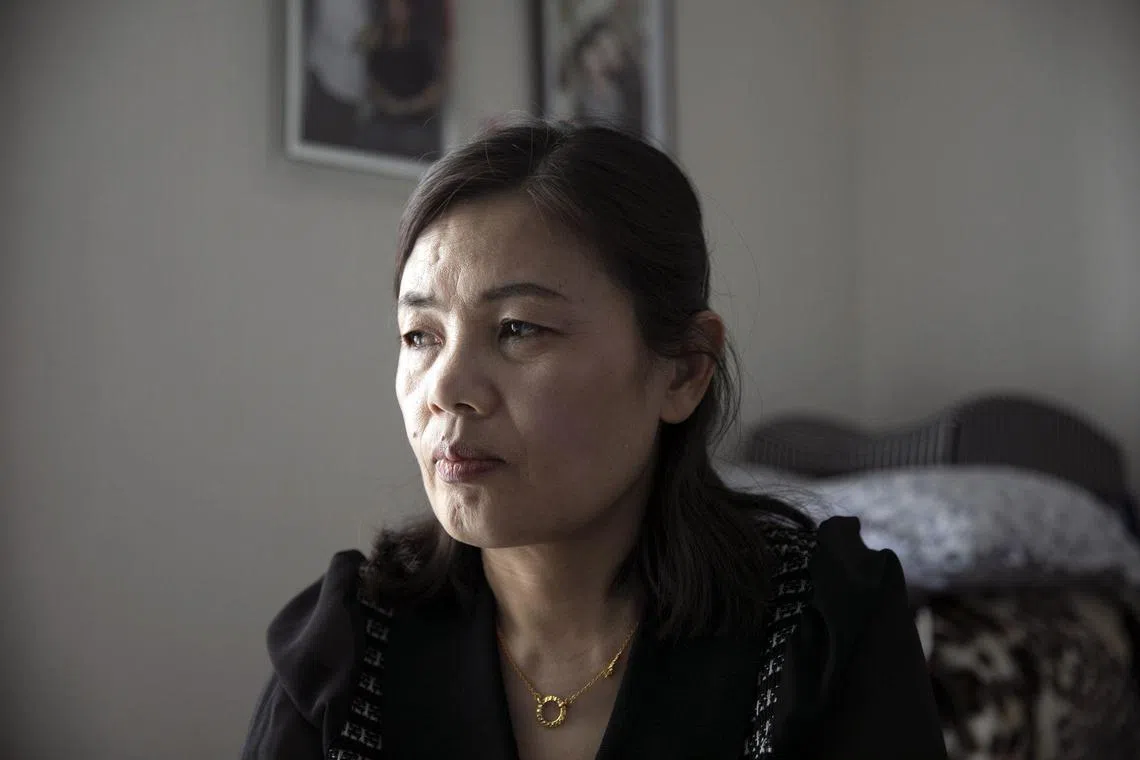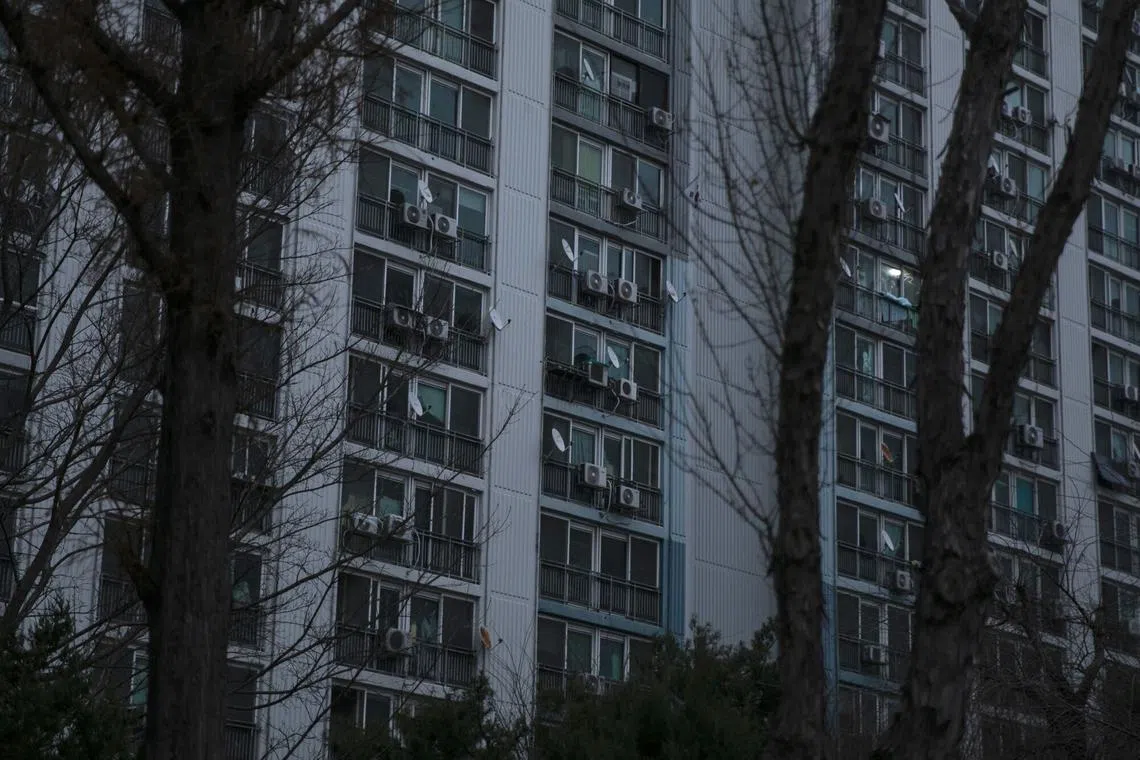North Korean defectors are dying lonely deaths in wealthy South
Sign up now: Get insights on Asia's fast-moving developments

Ms Im Su-ryuh defected from North Korea to South Korea just before the Covid-19 border crackdowns, but is homesick.
PHOTO: BLOOMBERG
Follow topic:
SEOUL – Her badly decomposed body was found in a rundown Seoul apartment about a year after she died, discovered only after government housing officials sought to evict her for failing to pay the rent.
The woman, 49, had been well known in the community of North Korean defectors. After fleeing the reclusive nation in the early 2000s, she soon became a success story for South Korea’s resettlement programme – even counselling other defectors on how to transition to life in a modern nation.
So it came as a shock among defectors that it took so long for anyone to find the woman, whose name and cause of death have not been publicly released since her body was discovered last October.
“Eventually she was found as a skeleton, which shows the society of North Korean defectors has a serious problem,” said Ms Lee Na-kyung, who left North Korea in 2005 and now runs an association that supports the thousands of other women who fled to South Korea. “She suffered from depression for a long time without letting anyone know.”
What is even worse: This is not the first time something like this has happened.
In 2019, the badly decomposed bodies of North Korean defector Han Seong-ok, 42, and her six-year-old son, Kim Dong-jin, were found in their apartment about two months after they died, apparently of starvation. After fleeing poverty and food shortages in North Korea, they found themselves unable to buy food in South Korea, where economic activity generated in a week is roughly equal to what North Korea produces in a year.
While refugees from Guatemala to Ukraine to Syria struggle to adapt to a new country, the resettlement of North Koreans should in theory be easier because they are moving to a country with a common language, culture and traditions. But North Korea’s decades of isolation and lack of uncensored information have caused a wide rift with South Korea, which has built an economy that supplies high-tech goods to all parts of the globe.
South Korean President Yoon Suk-yeol, a conservative who took office about a year ago, has pledged to make life easier for defectors. A plan his government announced in 2022 involves stronger networking opportunities for defectors and more services for those with low incomes. It also provides enhanced consultations for mental health, greater incentives for employers looking to hire defectors and improved education systems for children. The plan does not reveal specifics on expenditures.
That marks a shift from Mr Yoon’s predecessor, Mr Moon Jae-in, who was criticised by aid groups for not doing enough to help those who fled North Korea. In a bid to strike a deal on disarmament with North Korean leader Kim Jong Un, Mr Moon largely avoided mentioning human rights abuses that have prompted thousands of people to flee.
Still, those who work with North Korean defectors say more could be done. Ms Lee, who arrived as a single mother with little money and few marketable skills in the fast-moving capitalist country, said the government should help defectors acquire work-related licences or certificates that would help them over the long term.
“It gets difficult for them after living in South Korea for five, six or 10 years like this, because from then on all government support is just cut off,” she said. “You are left to survive on your own.”
Nearly 34,000 North Koreans have defected to South Korea since figures were first collected in 1998. While the number of new arrivals dropped to a trickle in recent years because of strict Covid-19 controls in North Korea and China, they are almost certain to start rising again now that border constraints are easing.
For many, the journey is arduous. Since the border between the two Koreas is one of the most militarised in the world, almost all defectors first flee to China until they can gather enough money to reach a third country, such as Thailand. Then they can apply for asylum in South Korea, which grants them citizenship after a security screening.
Once North Koreans arrive, South Korea offers an initial settlement funding of nine million won (S$9,200), vocational training and subsidies for employers for hiring defectors. Many defectors live near one another in blocks of inexpensive apartments, often the 25 sq m so-called “rental apartments” provided by the government.
When the support runs out, they must provide for themselves – and this often leads to grim outcomes.
The unemployment rate for defectors is about twice the national average. Many older defectors retain a northern accent, making them stand out each time they speak. Others bear scars such as psychological trauma or physical problems such as lung damage from digging for coal in unsafe mines with no protective equipment.
Nearly 90 per cent of defectors in Seoul said they have had trouble settling into their new homes after a decade, according to a 2022 study from the Seoul Institute. North Korean defectors between 2017 and 2021 experienced suicidal impulses more than double the rate of the South Korean population, which is already among the highest in the world, according to a survey from the Seoul Institute.
Covid-19 made the problem worse, according to Ms Joanna Hosaniak of the nonprofit Citizens Alliance for North Korean Human Rights, who has worked with defectors for more than a decade. Work became harder to find, human contacts became fewer and the public health system added new levels of complexity for people who had little experience using a smartphone or computer before they arrived in South Korea.
“We have this wonderful system of support established, yet people very often die at their homes out of loneliness,” she said.

An apartment which many North Korean defectors are believed to live in, in the Gayang-gu neighborhood of Seoul, South Korea.
PHOTO: BLOOMBERG
Women on the front lines
Nearly 72 per cent of defectors are women, according to South Korea’s Unification Ministry, and many have scars from their journey that could require a lifetime to heal. Family members are sometimes left behind in North Korea or China, and the defectors often face sexual violence from traffickers in China.
The woman who was found dead in 2022 had entered South Korea in 2002 and appeared to have thrived. But her co-workers began to lose contact with her after she quit her job as a counsellor in 2017.
Eventually, she stopped paying her phone and health insurance bills. After a year of her failing to pay her monthly rent of about US$100 (S$133) a month, the authorities opened the door to her home and made the grisly discovery, local media reports said.
For defector Im Su-ryuh, 51, the pandemic raised questions about her decision to flee North Korea. She crossed the Yalu River into China just before the Covid-19 border crackdowns, and with the help of a South Korean church and broker, she made it to Laos and then Thailand, where she landed in a refugee camp.
Ms Im managed to pay off the US$12,000 – equal to about 10 years of income for an average North Korean – to the broker who took her to China. She read out a letter to her mother left behind in North Korea saying she and her son are now “much more well-off than most North Korean executives”. The South Korean government provides them money and rice every month, she said, calling Seoul a “heaven on earth”.
But she cannot escape homesickness.
“I often cry because I miss the family I left behind,” she said. “It’s been about three years, but I still dream about North Korea.”
In some cases, leaving could prove fatal for family members who do not flee. One woman who defected to South Korea in 2017, and gave only her surname, Lee, because of safety concerns, could afford to bring only one of her sons with her. When the North Korean authorities found out about her defection, they beat her oldest son to death.
“I am so lonely,” she said. “I want to go back and die there – South Korea is as suffocating as the North.” BLOOMBERG

